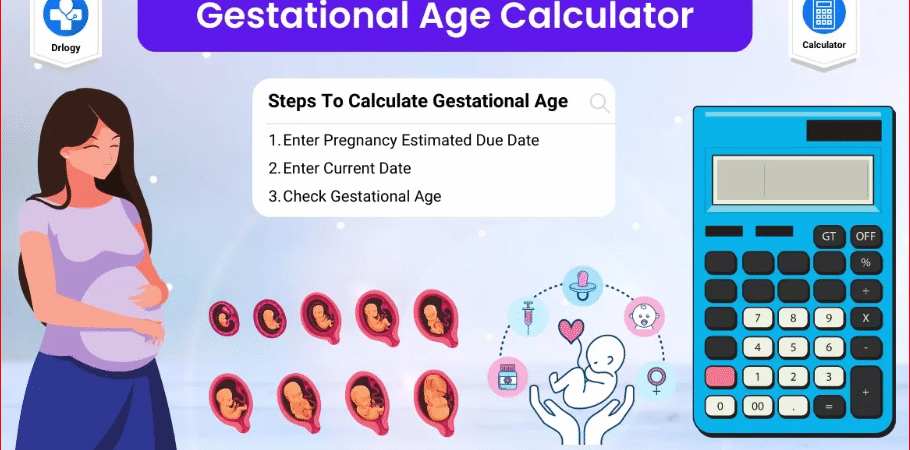Pregnancy Age Calculator
Enter the first day of your last menstrual period (LMP) to find your current pregnancy week and estimated due date.
PREGNANCY AGE CALCULATOR
Welcome to a New Journey – Track Your Pregnancy Instantly
Pregnancy is a wonderful phase filled with happiness and new beginnings. For expecting mothers, it is also a period full of questions, excitement, and the need for accurate information. A pregnancy age calculator is one of the simplest tools that can provide you with that information.
At WebUp, we have created a digital tool that helps you track every stage of pregnancy with ease. Whether you want to know your baby’s gestational age, expected due date, or weekly progress, our pregnancy age calculator is designed to give instant results.
What Exactly is a Pregnancy Age Calculator?
A pregnancy age calculator is a tool that helps you figure out how far along you are in your pregnancy. It estimates the gestational age and gives you an idea of your expected due date.
Why Should You Calculate Your Pregnancy Age?
- Tracking pregnancy age is important for the health of both the mother and the baby.
- It guides mothers on important milestones such as the first ultrasound, trimester changes, and the baby’s growth.
How Do Doctors Monitor Pregnancy Age?
Doctors often calculate pregnancy age to schedule important medical checkups, including blood tests, scans, and advice on diet and supplements. By knowing the correct pregnancy age, you and your doctor can monitor health more effectively.
How Does the Pregnancy Age Calculator Actually Work?
- Based on Last Menstrual Period (LMP): Most calculators work by taking your last menstrual period date (LMP). From this date, they estimate the pregnancy week and calculate the due date.
- Ultrasound and Gestational Age: Ultrasound scanning is a common method used by doctors to confirm gestational age. Our calculator uses standard medical formulas that match these results closely.
- Accuracy: While the calculator gives a very accurate estimate, actual due dates can vary. Every pregnancy is unique, so the calculator should be seen as a guide and not a medical substitute.
Why Use the WebUp Online Pregnancy Age Calculator?
- Track Fetal Development Week by Week: Follow your pregnancy journey and your baby’s development step by step.
- Know Your Estimated Due Date Easily: Get your due date so you can plan ahead for medical and family needs.
- Reduce Stress Instantly: Check your progress any time, anywhere—no waiting for appointments!
Pregnancy Age Calculator vs. Due Date Calculator – What’s the Difference?
- Pregnancy Age Calculator: Tells you how many weeks you have been pregnant.
- Due Date Calculator: Estimates when your baby will likely be born.
Both tools are useful for your medical planning and emotional preparation.
Other Handy WebUp Digital Tools for Pregnancy
- Weeks of Pregnancy Calculator: Instantly see your exact week of pregnancy.
- Ovulation & Conception Calculator: Learn your fertile days and boost your chances of conception.
- Baby Growth Calculator: Track your baby’s growth against medical charts.
Frequently Asked Questions – Get Quick Answers
Count from the first day of your last period to today, or use the WebUp Pregnancy Age Calculator for instant results.
Most Indian mothers count weeks based on their LMP. Online calculators help you find out exactly how many weeks you have completed.
Yes, by entering your LMP date, you can see your estimated delivery date (around 40 weeks from conception).
It is accurate per medical guidelines. Actual delivery may differ, and doctors may use ultrasounds for more precision.
WebUp provides an online pregnancy calculator that is mobile-friendly, fast, and easy to use.
Gestational age is measured from LMP, while conception age is measured from fertilization. Gestational age is the standard.
Track baby growth using weekly updates, baby growth calculators, or your doctor’s ultrasound reports.
Yes, but as ovulation can vary, LMP is more reliable.
LMP is a standard, reliable benchmark because not all mothers know their exact ovulation or conception day.
Contact the WebUp Pregnancy Support Team Any Time
📞 Call us: +91 7259693333
💬 WhatsApp: Chat Now
Try our tools: WebUp – Supporting Your Pregnancy Journey
Why Choose WebUp Pregnancy Tools?
- User-friendly steps – clear and easy for everyone.
- Free to use 24×7 – no downloads or logins required.
- Trusted by thousands of mothers for accurate and fast tracking.
Our mission is simple: to give mothers confidence during pregnancy with digital tools that are easy, quick, and reliable.
